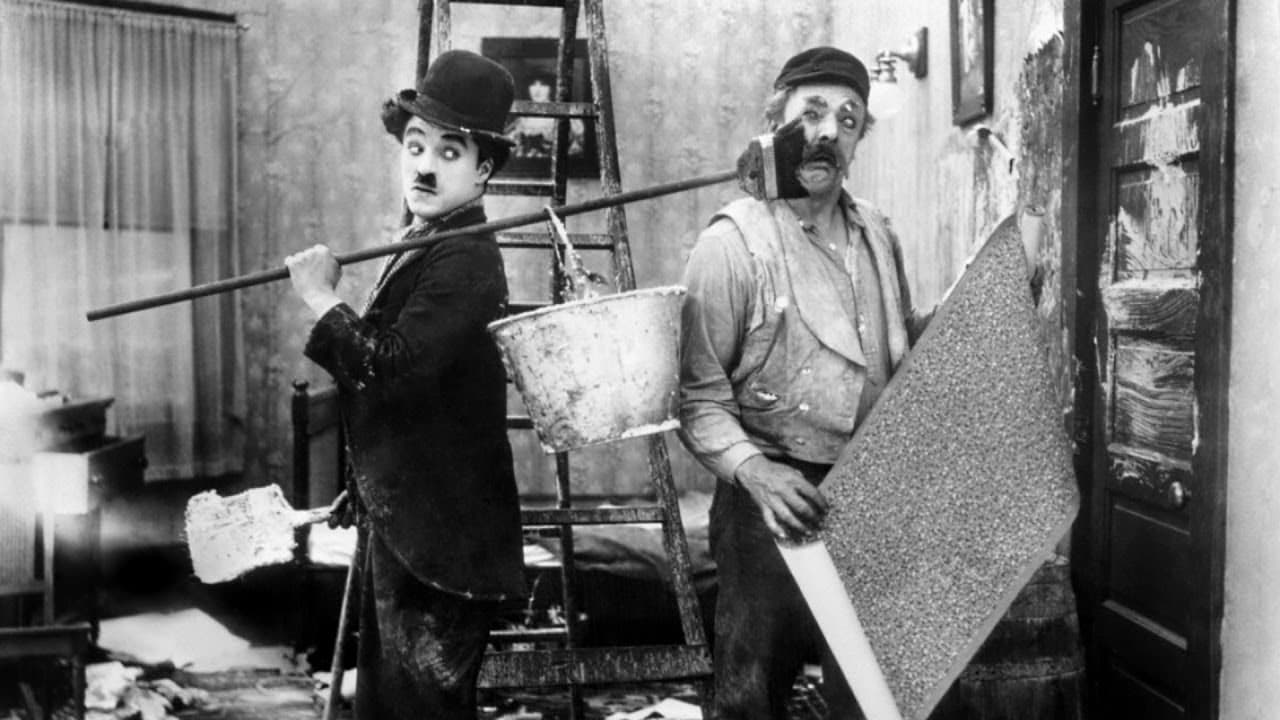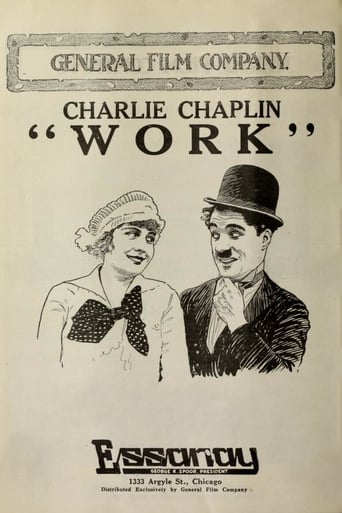

Very very predictable, including the post credit scene !!!
... View MoreSorry, this movie sucks
... View MoreThe movie runs out of plot and jokes well before the end of a two-hour running time, long for a light comedy.
... View MoreAn old-fashioned movie made with new-fashioned finesse.
... View More"Work" is a black-and-white silent short film from 1915, so this one is another work directed by and starring Charlie Chaplin from over a century already. You won't find too many of his regular cast members in here this time. The version I watched ran for 25 minutes roughly, but I see here on imdb that versions of 31 and even 41 minutes exist apparently too. Not sure if some scenes were lost, but I think it's rather all about the frames per second. Anyway, it's not important anyway as regardless of how long it is, simply too much happens in here for the film to feel authentic and realistic and more than shoving us one (not so) funny scene in the face. In this one Charlie's shenanigans, but also the other characters' messing up in their rage mostly have an impact on that and maybe a guilt too. It's a long and (in the truest sense of the word) messy road to that as a lot of dirty stuff happens in here (but not in the sexual sense obviously, hey these are the 10s, kissing was controversial back then already). Overall, I think the script was the main problem here as Chaplin and also others are far better actors and the constant shots at comedy made it difficult for the cast to shine or the movie to deliver in any genre as the chance was definitely there, but it almost seemed like they did not want it to happen. The slapstick just gets too much at some point, which is no surprise really as the mere quantity of jokes almost rules out that all, or even most, of them could have been convincing. One of the more known Chaplin shorts, not most known probably, but definitely not one of the best. Only watch if you really love Him (then you will also understand the capitalized H). I give this one a thumbs-down though.
... View MoreWork is a rather messy Chaplin short but feels overlong as some of the situations drag on.Chaplin plays a workman on his way to decorate a house, we see him pulling his boss on a cart who also whips him, there are several scenes where he crosses a train track just before the train passes through and then he struggles to get up a hill. In one scene the boss invites a friend to hop on the cart. You can see Chaplin is already taking a stand against exploitative capitalism already!Once they arrive at the middle class house, there is all kinds of slapstick as they try to wallpaper the house, there is an exploding stove, Chaplin takes a shine to the maid, and the householder's wife is visited by her secret lover.This is the first Chaplin short I have seen in some years, they just do not get repeated as often as they used to be on television. In Work Chaplin has not found his 'tramp' persona but there is some good skills used to for the slapstick but it gets too repetitive.
... View MoreChaplin again edited, wrote, directed, and starred in this film where Chaplin plays a put upon paper hanger. Chaplin has fun poking jabs at authority figures and upper-crust hypocrisy in a film more heavily plotted than his other films of the era. The film opens with visual gags of Chaplin pulling a work cart with his boss literally cracking the whip and the difficulties he faces. They arrive at a home of a snobby husband bossing his wife around. Once the wall-hanging paste is mixed, Chaplin plays with it like a musical instrument, creating havoc in the house while taking a shine to the maid (played by Edna Purviance). Chaplin's boss is literally up to his ears with wall-hanging paste (which appears more like plaster), the stove explodes several times, and the wife's secret lover (hilariously played by Leo White), dressed like a 19th century dandy, arrives much to the chagrin of the snobby husband. More chaos ensues as Chaplin, his boss, the lover, and the couple participate in a melange of slapstick punctuated by the husband firing shots, the stove exploding, and the house's interior reduced to rubble. The film is well edited, paced, and directed with a balance of plot and slapstick. **1/2 of 4 stars.
... View More"Work" is among the better of Chaplin's early comedies. It has a humorous situation that sets up some good comedy, and a good assortment of material. The story has Charlie as a paper-hanger, going with his supervisor to do a job in a home that already has enough problems. It does squander some screen time on material that isn't very funny, but then there are some very good moments that make up for it. There are also a couple of good subtle gags along with the more obvious physical comedy. It's the kind of setup that in later years Chaplin could have used to make a real classic. Here, it's unrefined, but it's still good entertainment. If you like Chaplin's earlier, less polished comedies, you should find this one worth a look.
... View More